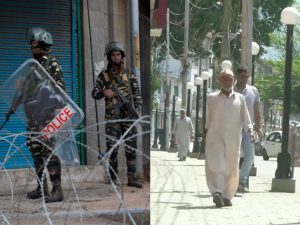 Janjivan Bureau / New Delhi : The Supreme Court on Tuesday asked the Centre to respond in four weeks to petitions challenging the change in constitutional status of Jammu and Kashmir following dilution of Article 370.
Janjivan Bureau / New Delhi : The Supreme Court on Tuesday asked the Centre to respond in four weeks to petitions challenging the change in constitutional status of Jammu and Kashmir following dilution of Article 370.
A five-judge Constitution Bench headed by Justice NV Ramana gave one week to the petitioners for filing their rejoinders.
The Bench — which will also have Justice Sanjay Kishan Kaul, Justice R Subhash Reddy, Justice BR Gavai and Justice Surya Kant — posted the matter for further hearing on November 14.
The top court made it clear that it would not accept any other petitions on the issue for hearing.
The court gave four weeks to the Centre to respond to the petitions after Attorney General KK Venugopal and Solicitor General Tushar Mehta said the Government needed to file its response before the matter was heard. Venugopal is representing the Centre while Mehta is representing the state of Jammu and Kashmir.
On behalf of one of the petitioners, senior advocate Raju Ramachandran said the Jammu and Kashmir Reorganisation Act 2019 was to come into effect from October 31 and the petitions will become infructuous.
“How can we hear without their counter,” the Bench said.
However, it made it clear that if it decided the case in favour of the petitioners, it will turn the clock back and restore the original constitutional status of the state.
The Bench said if needed, it will ask the Centre to produce all relevant documents pertaining to its decision to scrap special status to Jammu and Kashmir before it.
Article 370 and Article 35A together created a legal regime that discriminated against non-permanent residents of the state. But now Article 35A is completely gone while Article 370 stands considerably diluted, leading to end of the special status of the state.
The Supreme Court had on August 28 referred petitions challenging Presidential Orders nullifying Article 370 of the Constitution and bifurcation of Jammu and Kashmir into two union territories to a five-judge Constitution Bench.
While issuing notices to the Centre and Jammu and Kashmir, a three-judge Bench headed by Chief Justice of India Ranjan Gogoi had earlier said the matter would be heard in the first week of October.
Last week, the CJI set up the five-judge Constitution Bench led by Justice Ramana.
The Jammu and Kashmir Reorganisation Act, 2019, which divided the state into two union territories – Jammu and Kashmir and Ladakh, has already been notified in the official gazette and would come into effect on October 31.
There are several petitions challenging the Presidential Order nullifying Article 370, including those by Delhi-based advocate ML Sharma, Jammu and Kashmir-based lawyer Shakir Shabir, National Conference Lok Sabha MPs Mohammad AKbar Lone and Justice (Retd) Hasnain Masoodi, bureaucrat-turned-politician Shah Faesal and his party colleague Shehla Rashid.
There is another PIL filed by former interlocutor for Jammu and Kashmir Radha Kumar, Air Vice Marshal (Retd) Kapil Kak, Major General (Retd) Ashok Mehta, and former IAS officers Hindal Haidar Tyabji, Amitabha Pande and Gopal Pillai who have urged the top court to declare the August 5 Presidential Orders be declared “unconstitutional, void and inoperative”.
The Constitution (Application to Jammu & Kashmir) Order, 2019, was introduced on August 5 to supersede the Constitution (Application to Jammu & Kashmir) Order, 1954 that talked about provisions of the Constitution of India that would not apply to Jammu and Kashmir.
The 2019 Presidential Order made it clear that all provisions of the Constitution of India shall apply to Jammu and Kashmir.
Article 370(3) conferred powers on the President to make the provision inoperative. But such a move required concurrence of the Jammu and Kashmir Constituent Assembly which ceased to exist in January 1957.
The 2019 Presidential Order amended Article 367 to replace the reference to Constituent Assembly under Article 370(3) to mean Legislative Assembly.
It was after the August 5 Presidential Order that the Government introduced the Jammu & Kashmir Reorganisation Act, 2019 leading to bifurcation of the state into union territories of Jammu and Kashmir Ladakh.

















